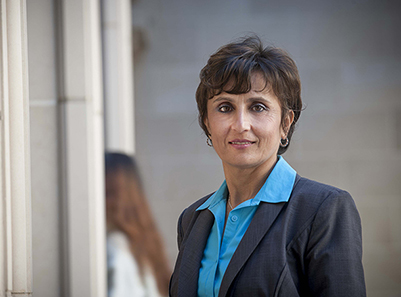
USC Stem Cell principal investigator Janet Moradian-Oldak has earned a 2015 IADR Innovation in Oral Care Award.
The prestigious award, which can be worth up to $75,000 and lasts one year, was given to only three recipients—two of whom are professors at Herman Ostrow School of Dentistry of USC. The other is Alireza Moshaverinia. It is co-sponsored by the International Association for Dental Research and GlaxoSmithKline and is intended to help investigators pursue innovative research in oral care.
The funding will help Moradian-Oldak and her team continue the development of a patent-pending hydrogel that has the potential to halt early caries lesions (white spots), rebuild lost enamel due to erosion, preserve tooth structure and stop tooth decay.
Enamel is the human body’s hardest tissue due to its high mineral content. It is also highly susceptible to demineralization processes, also known as dental caries (or cavities). Once enamel decays or is destroyed, it does not regenerate.
Moradian-Oldak’s research could change how dentists treat caries, which affects 92 percent of adults and 42 percent of children ages 2 to 11, according to the National Institute of Dental and Craniofacial Research website.
Next up for Moradian-Oldak and her team: testing the hydrogel in conditions that mimic the mouth—with saliva and biofilms present. They will also test its effectiveness against acidic beverages like coffee, juice and wine.
Her co-investigators include Qichao Ruan, research associate at Ostrow’s Center for Craniofacial Molecular Biology; Jin-Ho Phark, assistant professor of clinical dentistry; and Vanessa Pardi, assistant clinical professor in Ostrow’s divisions of periodontology, diagnostic sciences and dental hygiene.
Moradian-Oldak earned a master’s of science degree in structural chemistry and a doctoral degree in structural biology from the Weizmann Institute of Science in Israel. She has been with Ostrow since beginning her post-doctoral degree in 1992. She also serves as professor of biomedical sciences and bioengineering at the Viterbi School of Engineering.
“This award has a lot more value than just a monetary one,” Moradian-Oldak said. “It means recognition by an international organization with a mission to advance research, increase knowledge and improve health globally.”
More than that, though, she said the hydrogel could mean fewer visits to the dentist and less drilling.
The awarding organization, the International Association for Dental Research, is a non-profit organization with 11,000 members worldwide. Its mission is to advance research and increase knowledge for the improvement of oral health worldwide, according to its website. The organization publishes the Journal of Dental Research, a peer-reviewed scientific journal for dental, oral and craniofacial research.
Co-sponsor GlaxoSmithKline is a global healthcare company committed to improving the quality of human life by enabling people to do more, feel better and live longer, according to its website. Funding for the Innovation in Oral Care Awards is provided exclusively by GlaxoSmithKline.
Moradian-Oldak will be honored at an award reception and dinner at the IADR/AADR/CADR General Session and Exhibition in Boston in mid-March.
